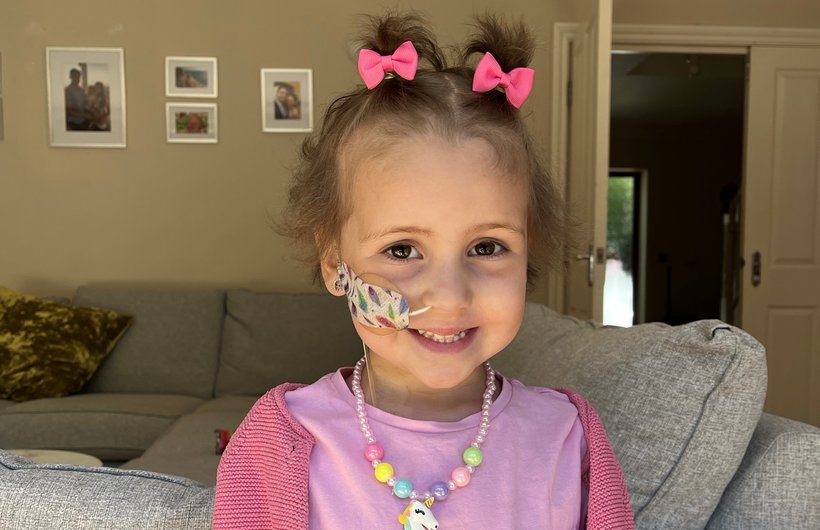Our External Affairs Strategy
In October 2023, we launched our first External Affairs Strategy which set out our commitment to facilitate systemic change to improve the clinical research landscape for children with cancer.
In our position as funders and drivers of neuroblastoma clinical research, we have become acutely aware that there are challenges in the neuroblastoma and paediatric cancer research environment, meaning the UK is at risk of falling behind, and patients are paying the price.
We have identified four key challenge areas that are preventing improvements to the care and outcomes for children with cancer, that must be addressed by the government with support from experts in this sector.
Key challenges
- Paediatric oncology is not prioritised by decision and policymakers.
- There is a lack of resource for research & development into novel childhood cancer treatments.
- There is limited capacity for the NHS to deliver clinical trials at the pace and efficiency that is needed.
- Access to novel therapies for children with cancer is limited in the UK, forcing families into impossible decisions around accessing treatments overseas.
We are now building a strategic alliance with others working in the childhood cancer landscape, including charity partners, leading clinicians and researchers and industry representatives, to engage the government in this important issue. We believe that together we can develop practical and meaningful solutions to the issues identified above and create a clinical research environment that better serves children affected by cancer who so desperately need change.
You can show your support for this mission by adding a message to the community board below.
Read our strategy

Why are we prioritising this work?
Many of the common therapies used to treat paediatric cancers in the UK are decades old, and no different to those used in adults. This means that children are receiving incredibly harsh, and toxic drugs that cause pain, suffering and life-lasting side effects – and in many cases, they are not effective enough.
To change this reality, better treatments are needed that are more effective in curing children’s cancers and come without long-lasting damage. The key to this is new clinical trials, that can be delivered rapidly and efficiently for the sake of children and their families – however, the UK is currently far from achieving this due to the issues identified above.
This has a direct impact on families affected by neuroblastoma who, without enough treatment options in the UK, can feel compelled to access treatment overseas at a staggering financial and emotional cost. For many others, this is simply not an option, and they have no choice but to hope that the limited options for relapsed high-risk neuroblastoma available through the NHS are enough.
#UnlockingHope campaign
Olivia's story
Olivia was diagnosed with high-risk neuroblastoma in January 2022 at just two-and-a-half years old.
“We were distraught,” says dad Nick. “Like the air had been sucked out of us. The pain in my chest was so heavy that it felt like someone was standing on me. We didn’t cry, we screamed. I can still hear it and feel the smallness of the room.”
“The hardest part was ringing our parents to tell them we finally knew what was wrong with Olivia. We were debilitated and had to share the news their youngest granddaughter has stage 4 cancer: in every bone in her body, in her organs, along her spine, her lymph nodes and in 85% of her bone marrow.”
Since her diagnosis, Olivia has completed 14 months of gruelling treatment which has included chemotherapy, high-dose chemotherapy, surgery to remove the primary tumour, six months of immunotherapy and three weeks of radiotherapy.
Despite initially responding well to the intensive treatment regime, Olivia’s parents, Kelly and Nick, received the devastating news that she had relapsed, meaning her cancer had returned.
There is currently no standard pathway of treatment for relapsed high-risk neuroblastoma, and few options are accessible in the UK. It remains very challenging to treat and has a survival rate of only 10%.
Because of these worrying statistics, Olivia's family have made the difficult decision to fundraise for treatment outside of the UK, which will costs hundreds of thousands of pounds.
“It just feels so unfair that there may be treatment out there that could save Olivia’s life, but we have to first find it, and then pay hundreds of thousands of pounds for it. We have worked all of our adult life and paid taxes. I feel it is our right to get lifesaving treatment for our daughter on the NHS.”
“I feel like the UK just gives up when it comes to relapse neuroblastoma. We hear about all these trials such as the CAR T-cell trial in Rome that could possibly save Olivia’s life, but it costs over £250,000 just for treatment. Then you have to find accommodation for four months which is astronomical in these cities.”
Such desperate situations must change, and no family should feel as if they have run out of options to save their child's life. This is why Solving Kids’ Cancer UK, with support from partners across the sector, has launched its first External Affairs Strategy – set on accelerating clinical research, driving change and Unlocking Hope for children with cancer.
You can support our #UnlockingHope campaign by adding a message to our community board below.


